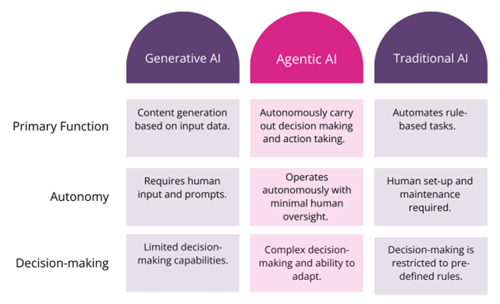Agentic AI: The Next Big Thing in Telecommunications?
Agentic AI is an emerging concept in the field of artificial intelligence that has recently gained significant prominence. The technology promises to offer new capabilities, such as the ability to adapt, learn, and make independent decisions with minimal human oversight required.
Agentic AI systems typically leverage multiple LLMs (large language models) that are deployed across various applications to enable autonomous decision making and action-taking and the completion of tasks with complex workflows.
Whilst generative AI has been advertised as a tool to automate various functions within the telecommunications industry, this ability is limited by the data with which the AI system is provided. However, Agentic AI will fulfil an unmet need in the telecommunications sector, by automating processes that enhance operational efficiency across the industry.
With the advancements that agentic AI can provide over both traditional AI and generative AI, Juniper Research anticipates that we will see it gain increased attention from players in the telecommunications industry over the next year. Autonomous decision making will enable better network management, customer service over chatbots, and more responsive security over networks.
Agentic AI vs Other AI Systems

Source: Juniper Research
The autonomy of Agentic AI will ensure that it offers a clear benefit over other AI technologies. But what is the specific relevance of the technology for the telecommunications industry?
Benefits of Agentic AI in Telecommunications
There are several different ways in which agentic AI systems could be utilised in telecommunications; offering advanced solutions for both network operators and enterprises.
For network operators, agentic AI will be used for the following:
- Network Management and Optimisation: Agentic AI could be used to optimise the performance of networks and reduce latency, by monitoring network traffic and automatically adjusting parameters. The predictive capabilities of agentic AI will also allow it to predict when a network failure will occur; in turn minimising downtime by ensuring proactive maintenance.
Agentic AI will aid in the monetisation of 5G networks for real-time IoT applications. Agentic AI will not only help with the management and optimising of the growing number of applications connected to 5G networks, but could help to ensure that applications receive a consistent performance from the network.
- Network Security and Fraud Detection: Agentic AI’s ability to adapt based on its learning will allow it to provide enhanced network security solutions within the telecommunications industry. Where current AI systems can monitor patterns in network traffic and identify when a change in these patterns occurs, agentic AI can go one step further and adjust security protocols based on the threat that it identifies.
For enterprises, agentic AI could be used for the following:
- Virtual Assistants: Agentic AI will enable virtual assistants to autonomously perform multi-step tasks; taking actions across multiple applications or services based on a user’s request. These virtual assistants can be used for both customer care and conversational commerce use cases, where they can make autonomous decisions based on customer requests and take action accordingly.
For conversational commerce interactions, these virtual assistants will be able to handle shopping tasks, including the process of searching for products and completing the purchase on behalf of the customer, with appropriate authorisation; creating a more secure customer experience.
- Personalisation of Customer Experiences: Agentic AI also has the potential to predict when a customer will most likely respond to a messaging campaign. The technology will be able to predict changing user preferences, such as a preferred channel for communication, based on patterns and can adapt its approach without the need for human intervention.
By employing agentic AI within business messaging applications, businesses will see increased engagement with messaging campaigns, as the technology will more accurately predict the channel with the highest engagement and the time to send a message to each customer.
Juniper Research therefore expects vendors that provide operator and enterprise solutions to be first to invest in agentic AI for use cases in telecommunications. Those that have already invested in generative AI must look to offer agentic AI as a complementary technology for enterprises, to provide solutions which further improve operational efficiency and boost customer experience.
We believe that agentic AI will be effective when integrated as part of operator networks to ensure efficiency and sustainability of networks. Improving network efficiency will be key to operators maximising revenue from 5G and future 6G networks.
Telcos are already exploring and implementing AI technologies, however, there is not yet widespread adoption. Juniper Research anticipates that the first agentic AI solutions for telcos will become commercially available in 2026. To effectively improve network management, agentic AI will have to be deployed across several key systems. This will include integration within the core network systems, the operations and management systems, and the data and security systems.
Latest research, whitepapers & press releases
-
 ReportFebruary 2026Fintech & Payments
ReportFebruary 2026Fintech & PaymentsMobile Money in Emerging Markets: 2026-2030
Our Mobile Money in Emerging Markets research report provides detailed evaluation and analysis of the ways in which the mobile financial services space is evolving and developing.
VIEW -
 ReportJanuary 2026IoT & Emerging Technology
ReportJanuary 2026IoT & Emerging TechnologyPost-quantum Cryptography Market: 2026-2035
Juniper Research’s Post-quantum Cryptography (PQC) research suite provides a comprehensive and insightful analysis of this market; enabling stakeholders, including PQC-enabled platform providers, specialists, cybersecurity consultancies, and many others, to understand future growth, key trends, and the competitive environment.
VIEW -
 ReportJanuary 2026Telecoms & Connectivity
ReportJanuary 2026Telecoms & ConnectivityMVNO in a Box Market: 2026-2030
Juniper Research’s MVNO in a Box research suite provides Mobile Virtual Network Enablers, Mobile Virtual Network Aggregators, and other players with detailed analysis and strategic recommendations for monetising demand for MVNO in a Box services.
VIEW -
 ReportDecember 2025
ReportDecember 2025AI Agents for Customer Experience Platforms Market: 2025-2030
Our comprehensive AI Agents for Customer Experience Platforms research suite comprises detailed assessment of a market that is set to disrupt mobile communications. It provides stakeholders with insight into the key opportunities within the AI agents for customer experience platforms market over the next two years.
VIEW -
 ReportDecember 2025Fintech & Payments
ReportDecember 2025Fintech & PaymentseCommerce Fraud Prevention Market: 2025-2030
Our eCommerce Fraud Prevention research suite provides a detailed and insightful analysis of this evolving market; enabling stakeholders from financial institutions, law enforcement agencies, regulatory bodies and technology vendors to understand future growth, key trends, and the competitive environment.
VIEW -
 ReportNovember 2025Telecoms & Connectivity
ReportNovember 2025Telecoms & ConnectivityeSIMs & iSIMs Market: 2025-2030
Juniper Research’s eSIMs and iSIMs research suite offers insightful analysis of a market set to experience significant growth in the next five years. The research suite provides mobile network operators (MNOs), original equipment manufacturers (OEMs), and eSIM management and platforms vendors with intelligence on how to capitalise on the market growth, and guidance on how eSIM-only devices and sensors, SGP.42, in-factory provisioning, and iSIMs will change the competitive landscape.
VIEW
-
 WhitepaperJanuary 2026IoT & Emerging Technology
WhitepaperJanuary 2026IoT & Emerging TechnologyPreparing for Q-Day: Post-quantum Security Shift
Our complimentary whitepaper, Preparing for Q-Day: Post-quantum Security Shift, assesses the factors which are increasing interest in adopting PQC, and challenges to PQC adoption. Additionally, it includes a forecast summary of the global spend on PQC by 2035.
VIEW -
 WhitepaperJanuary 2026Telecoms & Connectivity
WhitepaperJanuary 2026Telecoms & ConnectivityHow Fintechs and Retail Companies Are Changing Mobile Services
Our complimentary whitepaper, How Fintechs and Retail Companies Are Changing Mobile Services, explores the key enterprises entering the MVNO market and launching mobile services via MVNO in a Box partners. It also provides forecasts for total MVNO revenue from mobile subscribers in 2030.
VIEW -
 WhitepaperJanuary 2026IoT & Emerging Technology
WhitepaperJanuary 2026IoT & Emerging TechnologyTop 10 Emerging Tech Trends 2026
See which emerging technologies will shape enterprise strategy and investment in 2026; from post-quantum cryptography to neuromorphic computing and next-generation infrastructure.
VIEW -
 WhitepaperDecember 2025Telecoms & Connectivity
WhitepaperDecember 2025Telecoms & ConnectivityHuman + AI: Drivers of Customer Experience AI Agents in 2026
Our complimentary whitepaper, Human + AI: Drivers of Customer Experience AI Agents in 2026, examines the key drivers of the AI agents for customer experience platforms market in 2025.
VIEW -
 WhitepaperDecember 2025Fintech & Payments
WhitepaperDecember 2025Fintech & PaymentsBeyond Chargebacks: The True Cost of Fraud for Digital Commerce
Our complimentary whitepaper, Beyond Chargebacks: The True Cost of Fraud for Digital Commerce, examines the state of the eCommerce fraud prevention market; considering the impact of evolving digital fraud strategies, including key trends such as identity theft, account takeovers, chargebacks, policy abuse and friendly fraud.
VIEW -
 WhitepaperNovember 2025Telecoms & Connectivity
WhitepaperNovember 2025Telecoms & ConnectivityeSIM-only Devices: The Impact on Operators, Consumers, and IoT
Our complimentary whitepaper, eSIM-only Devices: The Impact on Operators, Consumers, and IoT, explores the challenges and opportunities for the three segments, with a particular focus on eSIM-only smartphones and SGP.42.
VIEW
-
Fintech & Payments
Civic Identity Apps, Tokenisation, & AI to Revolutionise Fraud & Security Globally in 2026
January 2026 -
Telecoms & Connectivity
eSIM Connections to Reach 1.5bn Globally in 2026, But Platforms Must Adapt to Fuel Growing IoT Demand
January 2026 -
Fintech & Payments
Modern Card Issuing Platforms to Issue 1.6 Billion Payment Cards in 2030, as Banks Shift Focus From UX to Cost Efficiency
January 2026 -
IoT & Emerging Technology
Post-quantum Cryptography Market to Exceed $13 Billion by 2035 as Q-Day Awareness Accelerates
January 2026 -
Fintech & Payments
Digital Wallets: QR Codes to Constitute Half of All Wallet Transactions Globally Over Next Five Years
January 2026 -
Telecoms & Connectivity
MVNO in a Box Platforms to Drive MVNO Market to 438 Million Subscribers Globally by 2030
January 2026


















